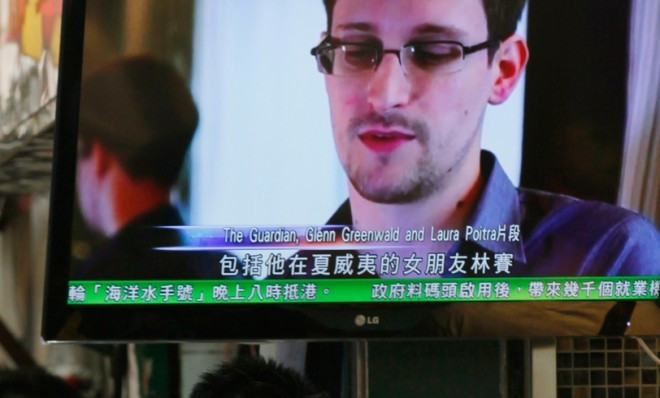Hundreds March On US Consulate in Hong Kong to Support Whistleblower Snowden

Hundreds of demonstrators have marched on the US Consulate in Hong Kong in protest at moves to extradite the former National Security Agency official Edward Snowden to stand trial in the US for his role in leaking documents concerning the "Prism" internet surveillance programme.
Chanting slogans such as "Shame US Government", protesters rallied in support of Snowden's fight to remain in Hong Kong after documents he admits leaking were passed to the Guardian and Washington Post newspapers.
Protest organiser Tom Grundy, from Britain, called on China and the US to refrain from pressuring Hong Kong over Snowden's leave to remain.
"We want an independent judiciary to decide on the case," Grundy said.
Despite its return to China in 1997, Hong Kong retains a respected legal system left over from its British colonial past.
However, some activists have criticised Beijing's perceived influence on recent court appointments.
Hong Kong's chief executive Leung Chun-ying said the state would follow extradition procedures if it received a request from the US to surrender Snowden.
Leung indicated the Hong Kong government would examine Snowden's disclosure that the National Security Agency might have gained covert access to an internet server cluster located at the Chinese University of Hong Kong.
"When the relevant mechanism is activated, the Hong Kong SAR [Special Administrative Region] Government will handle the case of Mr Snowden in accordance with the laws and established procedures of Hong Kong," Leung said.
"Meanwhile, the government will follow up on any incidents related to the privacy or other rights of the institutions or people in Hong Kong being violated."
Organisers said that about 900 protesters took part in the demonstration, though police said the number was closer to 300.
The march was organised by more than two dozen groups, including the Democratic Party of Hong Kong, which has long criticised Beijing for restricting individual liberties.
"He should be given the right to stay in Hong Kong," said Albert Ho, a former chairman of the Democratic Party.
"We must not let anybody intervene. We must be able to show that Hong Kong will not give in to pressure from other governments."
State media in mainland China have embraced Snowden, telling the South China Morning Post that the US "monitors Internet traffic on the mainland and in Hong Kong".
Martin Lee, the founding chairman of the Democratic Party, said the Chinese government itself engaged in close monitoring of phone calls and internet activity in Hong Kong.
The Chinese government has even been prepared to leak opponents' details to news outlets to punish them, he said.
Democracy activists have criticised the Chinese government's extensive surveillance programmes, and in turn have been accused of disloyalty to Beijing.
On Saturday the English language newspaper China Daily printed excerpts from a pro-Beijing newspaper in Hong Kong saying Snowden's disclosures had damaged the standing of democracy advocates and their admiration for the United States.
"The latest leaks have put the local rights politicians in a rather awkward position by exposing their idol's true character," it said.
The consulate issued a safety warning this week, urging Americans to stay away from the building.
© Copyright IBTimes 2025. All rights reserved.





















